Welcome to your ETSU Human Resource Recruitment and Hiring page. The Office of Human Resources (HR) maintains the university’s job posting and applicant management systems and related policies and processes designed to assist departments and search committees to recruit and select a qualified and diverse workforce. This page provides essential links to recruiting and hiring information.
New Employee Onboarding and Hire Dates
Standardized Hire Dates for Calendar Year 2024
Standardized Hire Dates for Calendar Year 2025
Mondays are the standardized hire dates for temporary hires
*Onboarding date may be different than the start date*
**Dates may be added or changed based on onboarding needs**
Important Information and Announcements
-
Adjustment to Regular Hiring Proposal Workflow States
Due to the standardized hiring beginning in January 2023, the eJobs HR Processing steps have been adjusted.
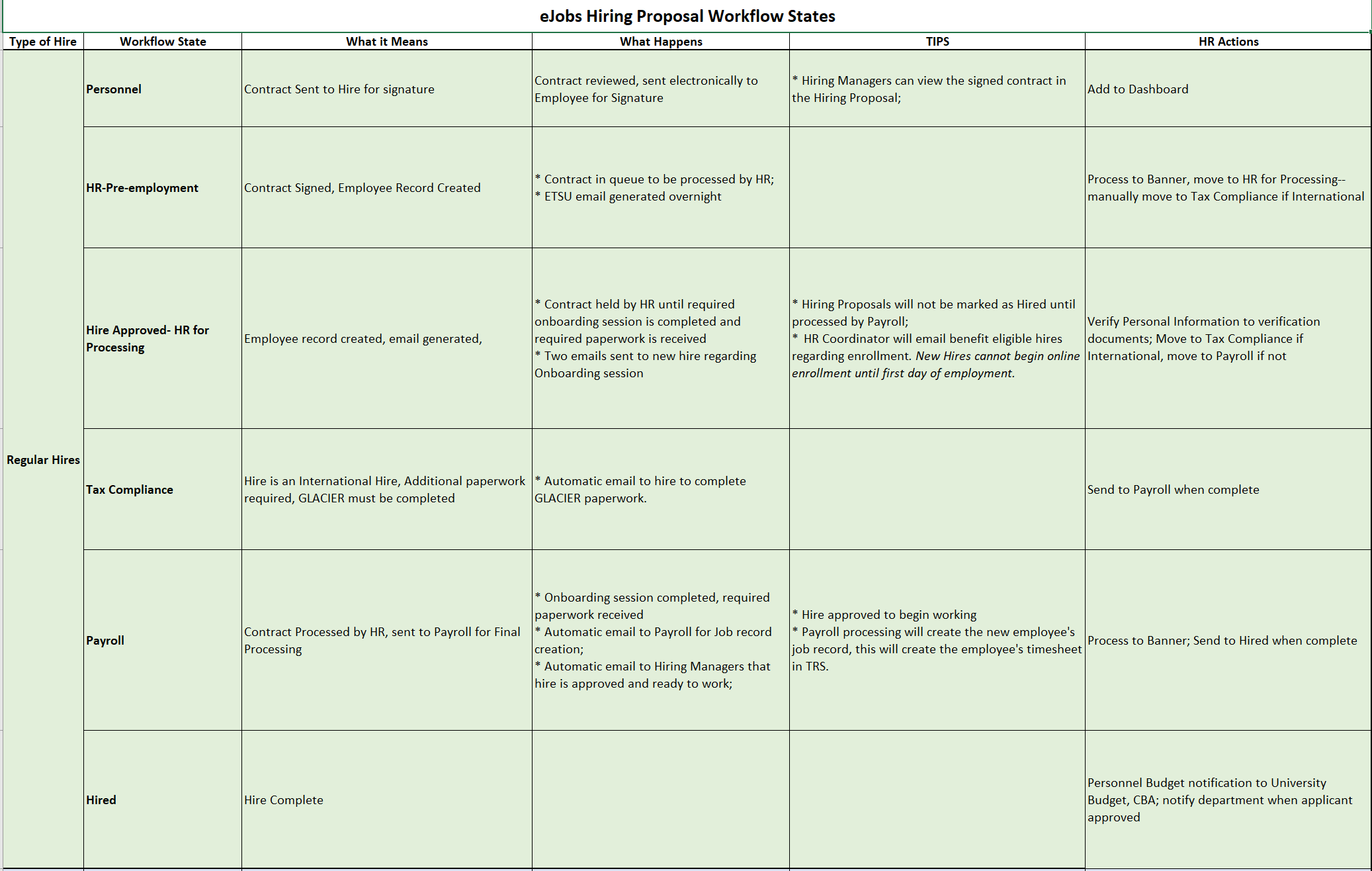
Please note: Once Human Resources has processed a contract, and the hire is approved to begin working, the hiring proposal will be moved to the Payroll state for final processing.HR Processing Workflow Steps Chart
-
UPDATED TEMPORARY HIRING PROPOSAL WORKFLOW
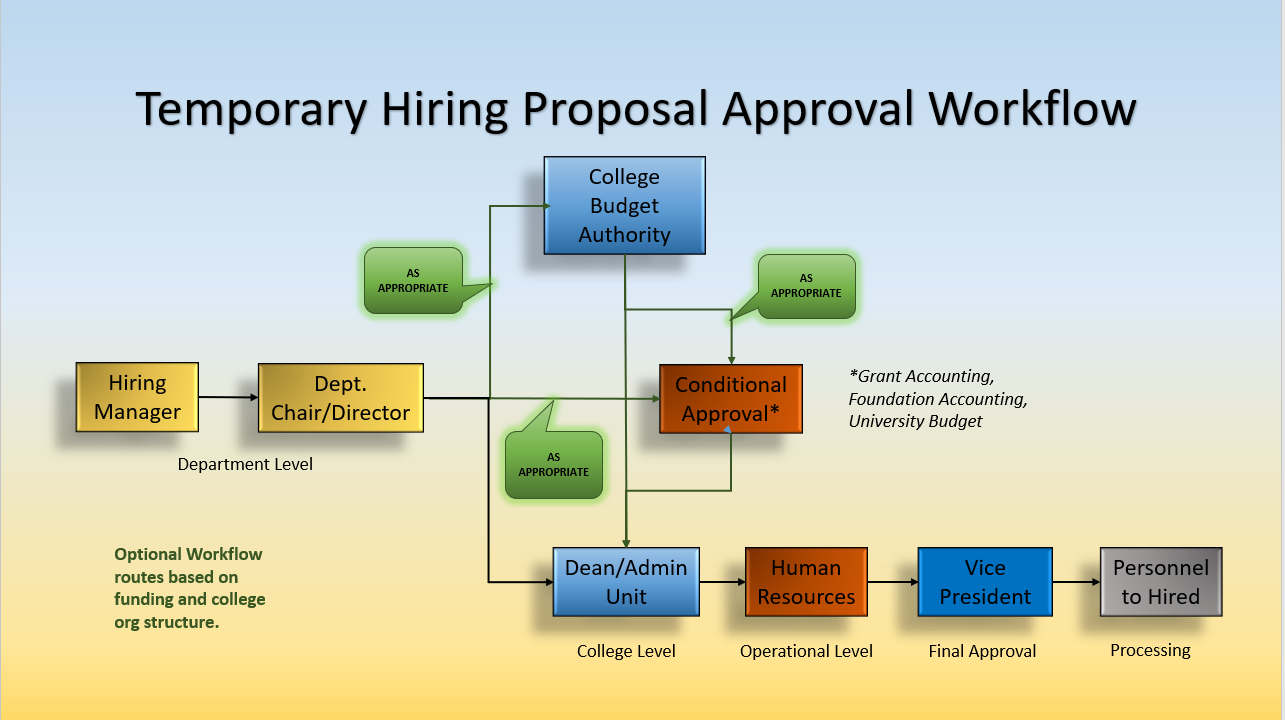
-
Human Resource Business Partners
Meet your HR Business Partners (HRBP) - Your HRBP is your single point contact and strategic partner for your department's HR activities.
-
Updated Process Information
HIRING, THE HIRING PROCESS--Additional information regarding the changes to the hiring processes has been added to the information below.
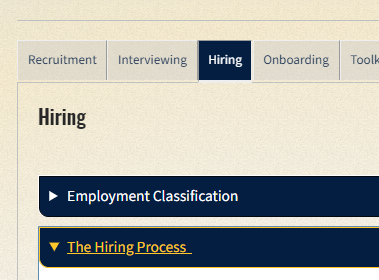
-
Search Confidentiality
Search Committees should treat all candidate information with strict confidentiality through out the search process. Effective immediately, written acknowledgment is no longer required. Committees may discontinue use of the Confidentiality Form. By logging in to review applications/applicants, committee members acknowledge their responsibility to keep the information obtained during the search process confidential, not just during the search, but thereafter.
No employee is allowed to begin work prior to presenting their I9 employment authorization documents in person to Human Resources. Department Heads/Supervisors that allow potential employees to begin work prior to formal approval may be personally liable for wages, fines and fees, due during the period prior to formal approval being obtained.
Recruitment
East Tennessee State University (ETSU) is an Equal Opportunity/Affirmative Action employer and does not discriminate on the basis of race, color, religion, creed, sex,sexual orientation, gender identity/expression, age, genetic information, national origin, disability status, veteran status, or any other legally protected class in its programs and activities. ETSU specifically finds that diversity of faculty, administrators, and staff is a crucial element of the educational process and reaffirms its commitment to enhancing education through affirmative action to increase diversity at all levels.
The Office of Human Resources provides assistance to the campus community to ensure equality of the recruitment process for all hires.
-
What is Recruitment?
Recruitment involves everything from identifying the need to filling a position. Recruitment is the process of actively attracting top talent, screening, interviewing, and hiring for a particular position.
Recruitment is the first step in building an organization's human capital. At a high level, the goals are to locate and hire the best candidates, on time, and on budget. The recruitment process should ensure that all processes and procedures have been taken to reduce and/or be free of biases.
Steps include :
- Identifying the need.
- What kind of work is the position be responsible for?
- What knowledge, skills, abilities ,education and experience is minimally required to perform the essential functions of the position?
- Is there enough work for a full-time or part-time position?
- What kind of budget is available for the position?
- Devising a recruitment strategy/plan.
- Determine the search method.
- Individual Supervisor
- Search Committee (to ensure an effective and efficient decision-making process, a committee of 5-8
is recommended; no less than 3)
- Seek out committee members who:
- Are familiar in the field's responsibilities, knowledge, skills and abilities of the advertised position.
- Are respected within the University community and their respective disciplines or professions.
- Are open-minded and committed to diversity, inclusion, and a fair process.
- Are able to negotiate conflict to achieve group results.
- Seek out committee members who:
- What geographical area should be considered?
- Local
- National
- International
- Which source of recruitment is to be practiced?
- External applicants.
- Internal applicants.
- Both
- Determine the search method.
- Advertising the position.
- Internet Recruiting
- External publication advertisements
- Direct Recruitment
- Contacting recruiting agencies
- Headhunters
- Implement the Recruiting Strategy.
- Understand the requirements for the position.
- Be pro-active.
- Effective and Inclusive Recruitment Strategies
- Identifying the need.
-
Who Should Be Recruiting?
Ideally, everyone should be actively recruiting when the opportunity presents itself. Recruitment is an on-going process that requires enthusiasm and effort.
Roles and Responsibilities coming soon!
-
EEO/AA Responsibilities
A recruitment strategy is required for all searches for employees at the University. Recruiting efforts can take many forms, including advertising, networking, job postings on listservs, recruitment efforts made at conferences, and contact with professional associations.
The University's legal obligations as a federal contractor require it to design specific efforts to promote equal employment opportunity. ETSU does not utilize a quota system in its hiring practices but rather demonstrates compliance with AA/EEO through a good faith effort to reach underrepresented populations and create a diverse applicant pool. ETSU can only demonstrate this good-faith effort through documentation of an implemented recruitment strategy, therefore search committees must submit evidence of their recruitment efforts in the Recruitment Plan section of eJobs.
There is no required number of recruitment sources; however, search committees must demonstrate a good faith effort to recruit the position as broadly as possible. Search committees are encouraged to demonstrate they have gone beyond this standard recruiting to target diverse applicant pools specific to the position. The HR Generalist/EEO Specialist may assist in this process; however, the overall recruitment strategy is ultimately the responsibility of the search committee.
Federal regulations require contractors to take affirmative action to recruit, employ and promote qualified protected class individuals. To review ETSUs Affirmative Action plan, please visit University Compliance . Protected class members include:
- Underrepresented groups (including minorities and women) - Current federal regulation is based on the availability of workforce in your area.
- Veterans and Persons with Disabilities - Current federal regulations aspire to achieve workforces in which 7% of employees are covered veterans and 7% are persons with a disability.
-
Where and How to Recruit
-
Effective Advertisements
An effective advertisement should:
- Be used as a tool to screen for job knowledge
- Have a good job title and description
- Focus on essential functions
- Avoid broad generalizations
- Attract the attention of appropriate job-seekers
- Attract relevant interest by making the candidate see themselves in the position
- Create a desire to work at ETSU (family friendly benefits, local area information, no state income tax, etc.)
- Provide clear instructions for applying
- Keep the advertisement simple
- Only using phrases that are essential to the job
- Providing enough detailed so applicants know if it is a right-fit for them
-
Practices to Promote Diversity & Ensure Equity and Inclusion
- What is Diversity?
- The range of human differences, including but not limited to race, ethnicity, gender, gender identity, sexual orientation, age, social class, physical ability or attributes, religious or ethical values system, national origin, veteran status, and political beliefs. Diversity encompasses complex differences and similarities in perspectives, identities, and points of view among members of an institution as well as among individuals who make up the wider community.
- What is Inclusion?
- Involvement and empowerment, where the inherent worth and dignity of all people are recognized. An inclusive university promotes and sustains a sense of belonging; it values and practices respect for the talents, belief, backgrounds, and ways of living of its members.
- What is a Protected Class?
- A group of people with a common characteristic who are legally protected from employment discrimination on the basis of that characteristic. Protected classes are created by both federal and state law.
- What is Affirmative Action?
-
An active effort to improve the employment or educational opportunities of members that are commonly and historically discriminated against (protected class).
When an employee or applicant believes he/she has been discriminated against, they can seek resolution of the problem following proper university procedures. Affirmative Action matters should be filed directly with the Affirmative Action Officer/University Compliance.
- Include equitable, diverse, and inclusive language
- Broaden Job description to attract a more diverse pool
- Advertise to underrepresented groups
- Advertise family friendly policies and great benefits.
- Ask specially for recommendation of candidates from groups that are underrepresented in your department when recruiting
- Go beyond the "usual" range of institutions/resources you normally recruit
Recruitment efforts should be strategic and show the University’s good faith efforts in generating a diverse applicant pool. For assistance in developing an effective and inclusive recruitment plan you may find the Effective and Inclusive Recruitment Strategies helpful, or you may reach out to your HR Business Partner.
-
Advertising and Recruiting Resources
Recommended places to advertise
All jobs are automatically posted to:
- HigherEdJobs.com
- SREB (Faculty, Research, and Fellowship positions ONLY)
More ways to recruit
- Advertise in field-specific journals, associations anlistservsvs
- Direct contact with qualified candidates in your network and/or from similar/previous searches
- Department website and/or social media sites
- Special interest organizations or groups
- Job fairs
- Conferences
- Recruiting agencies
- Effective and Inclusive Recruitment Strategies
University Resources
- Office of Disability Services
- Office of Equity and Inclusion
- Office of Veterans Affairs
- Office of University Counsel
- Student Life and Enrollment
- Multicultural Center
- Women's Resource Center
Helpful Links
-
Suggested Language for Advertisements
Affirmative Action/Equal Opportunity Statement
- East Tennessee State University (ETSU) is an Equal Opportunity/Affirmative Action employer.
- AA/EOE
Closing Date Statement
Open until filled postings, or for those postings that are posted for longer than the minimal required, the following statement should be used either in the Job Summary or Special Instructions:
- The closing date is subject to change without notice to applicants.
AA/EOE Statement
- ETSU is committed to ensuring that our students, faculty, and staff are valued and work in an environment of openness and acceptance. ETSU is an Equal Opportunity/Affirmative Action employer.
Apply at Statement
- For full consideration, candidates must apply and submit all required documents to the university’s hiring system and follow any special instructions listed in the posting. See the full position description and apply at https://jobs.etsu.edu (or list the direct link to the posting)
Others/Misc
- Effective/Starting Date
- The expected start date is for Fall 20xx.
- Application Review date
- Review of applications will begixxxxxx.
- Faculty Rank and Salary
- Noncommittal statement - "commensurate with education and experience"
- Faculty rank commiserate with education and experience. Some appointments may be eligible for tenure. Clinical and Research track appointments may be convertible to tenure-track no later than the end of year three of the appointment.
Facts and Information about ETSU and Community
-
-
eJobsobs Recruitment Plan
Method of Directing the Search
- Search Committee: Search Committees are required for all benefited faculty and high level administrative searches (Administrative/Professional 9 and above). The Committee memberships should be diverse as appropriate for the particular position. The only identifier required is the committee chair. The demographics of search committee members is no longer required.
- Individual Supervisor: For support staff and some administrative positions, the supervisor may manage the search including reviewing applicants, checking references and selecting a candidate.
Describe how you will achieve diversity on your Search Committee.
This section is filled out only if you chose to direct the search via a search committee. State how your committee is diverse without using specific identifiers. E.g. "The committee includes both men and women, a student in the program, and both clinical and academic faculty."
Describe how you will seek requests for nominations and make direct contacts to ensure minority participation in the applicant pool.
Explain how your recruitment plan will reach a diverse audience. E.g. "The job will be posted in nation-wide faculty recruiting websitlistservsrvs and professional journals. Search committee members and faculty will make direct contact with qualified candidates in their networks."
List places to be advertised.
List the names of publications, websites, newspapers, social media sites, etc. where you will advertise. All jobs are automatically posted the following (this must be listed in your recruitment plan as appropriate):- HigherEdJobs.com
Higher Education Recruitment ConsortiuHERCERC)
SREB (Faculty, Research, and Fellowship positions ONLY)
Facebook
LinkedIn
Twitter
-
The Fair Labor Standards Act (FLSA)
The Fair Labor Standards Act (FLSA) establishes minimum wage and overtime pay standards for full-time and part-time employees. The Wage and Hour Division( WHD) of the U.S. Department of Labor (DOL) administers and enforces FLSA.
The new salary threshold is $684 per week ($35,568 annually). The final rule will be effective January 1, 2020.
Please see the FLSA Guide and Tools for additional information.
-
Equivalences for Education and Experiences
Did you know that considering equivalent experience is an option available to hiring units when filling positions? Hiring units can substitute the educational requirement with years of related work experience if defined in the job posting (as appropriate). If you are considering equivalences for education visit the Equivalences for Education and Experiences webpage to learn more.
Part-time, Graduate Assistance, Student Worker, Volunteer experience cannot be considered as years of experience unless otherwise stated in the job posting. Example: “Related part-time, student worker, and/or graduate assistance experience may be considered”.
Interviewing
The most important part of selecting a new employee is the interview process. This process is a means of gathering information about applicants or candidates to evaluate their qualifications. While the interview itself is necessary, it is not sufficient alone for a quality search.
-
Initial Screening
Screening Applicants
At the initial screening stage, the role of the search committee/supervisor is to evaluate applicant’s qualifications and to determine which applicants are the most qualified for the position. Once applicants begin to apply for a position, the search committee/supervisor can begin reviewing the applicant pool. During this initial screening, the search committee/supervisor should indicate whether each applicant meets the required qualifications as advertised. If so, they those applicants should receive further consideration.
When conducting internet searches or screening applicants' social media profile(s), proceed with caution, as it can be a legal risk if information is misused. The information obtained via Google, and other social media sites should not be used as the sole reason to interview/not interview OR hire/not hire an applicant. If departments find something of concern during an internet search, they should notify their HR Business Partner.
The screening process begins with the analysis of materials sent in response to the job posting. Members of a search committee may find the Candidate Rating Form or Applicant Matrix Form to be useful when screening applicants. A rating form provides each committee member a quick reference as to why individual candidates are preferred. It is important to:
- Keep the position description in mind.
- Know the required qualification for the position. Employment success and long-term retention of persons hired for positions offered at ETSU is to determine that the candidate is fully qualified and suited to the position offered. If equivalences were used, be sure candidates are rated appropriately.
- Understand your biases.
- Not to discriminate (Equal Employment Opportunity, Affirmative Action, and Discrimination Policy)
The committee chair/supervisor will then submit an email (including the posting number) through their appropriate approval process to Human Resources at hr@etsu.edu requesting to certify the pool of candidates. Human Resources reviews and approves all applicant pools to ensure that the interviewee pool is representative of the applicant pool as per the university's Affirmative Action Plan.
Additional screening methods:
- Additional interviews
- Telephone or video interviews
- Work samples
- Presentations or lecture demonstrations
- Portfolios
- Written questionnaires
- Statements of philosophy or approach to work
- Verification of credentials
- Reference checks
- Background checks
Due to the multiple criteria, the multiple selection methods, the input of many stakeholders, and the dynamic nature of the selection process, it may be helpful to utilize an evaluation matrix to compile and consider all of the information collected. Evaluative Criteria can be utilized eJobsobs. Please see the eJobs User Guide for Hiring Managers for details.
University policy requires certain actions during the selection process. For details, please see the Guidelines for Filling Vacancies or contact your HR Business Partner.
Inappropriate reasons to eliminate applicants
- They are "overqualified"
- There are good reasons why a person might choose to take a job with a lower level of responsibility than they’ve had in the past. Don’t assume that holding a higher-level job necessarily means that a person can do lower-level tasks. If you find yourself making assumptions about the person’s motivation, check them out at the interview, or call the person and make sure they understand that the job will not be at a higher level than advertised.
- They are currently in higher paying position.
- Do not make assumptions about an individuals finical need. If you find yourself making assumptions about the person’s motivation, check them out at the interview, or call the person and make sure they understand that the job will not be at a higher level than advertised.
- They did not meet the preferred qualifications.
- Preferred qualifications alone may not be used to eliminate an applicant. These additional qualifications make a candidate ideal, but may not be necessary to successfully perform the job.
- They are not local; they live out of state.
- The residence of an applicant shouldn't be used to eliminate them. If you are unable to cover travel expenses, consider interviewing the candidate by telephone/Skype; or ask the candidate if they can pay their own way.
REMINDER: Hand-written notes (including emails and reference checks) created by search committee members/ supervisor are auditableble, and should be maintained by the department – in the recruitment file - per the Records Disposal Policy from the date hire is made (current policy states 5 years). After reviewing all candidates, the search committee chair/supervisor or hiring manager will update the status of all applicants.
-
Pre-interview Requirements and Guidelines
Prior to contacting candidates to set up interviews:
- Have your applicant pool certified by Human Resources. Email your request to hr@etsu.edu . See below for additional information. All candidates Recommended for Interview must be interviewed.
- In accordance with the University's Affirmative Action Plan the search committee/
supervisor must create a broad and diverse pool of applicants. The interviewee pool
should be representative of the applicant pool. Human Resources reviews and approves
all applicant pools prior to the scheduling of interviews. After reviewing all candidates,
the search committee chair/supervisor or hiring manager will:
- Update the status of all applicants to 'Recommend for Interview', 'Does not meet minimum qualifications' or 'Not Recommended for Interview'. If the reason for not interviewing a candidate is ‘Other’, please contact HR before submitting your pool for approval or provide additional information in your email. NOTE: Only individuals listed as an Applicant Reviewer will be able to update the status of applicants
- The committee chair/supervisor will then submit an email (including the posting number) through their appropriate approval process to Human Resources at hr@etsu.edu requesting to certify the pool of candidates.
- Human Resources will review the applicant pool and may request additional information and/or refer applicants who meet stated required qualifications to the hiring unit for interview. Human Resources will approve the pool via email to the committee chair/supervisor or the individual that sent the request. All candidates Recommended for Interview must be interviewed.
- In accordance with the University's Affirmative Action Plan the search committee/
supervisor must create a broad and diverse pool of applicants. The interviewee pool
should be representative of the applicant pool. Human Resources reviews and approves
all applicant pools prior to the scheduling of interviews. After reviewing all candidates,
the search committee chair/supervisor or hiring manager will:
- Review Interview Guidelines to understand what questions can and cannot be asked.
- Decide the method of your interview (telephone, Zoom, in person).
- Identify the interview questions. Interviews should be structured where you ask each applicant the same list of questions. HR has gathered sample interview questions (see below).
- Make sure individuals participating in the interview process have set aside time on their calendars.
- Decide on the location of the interviews. Room(s) should be accessible and free from interruptions. If conducting interviews by telephone or Skype, be sure the room has these capabilities.
- Have your applicant pool certified by Human Resources. Email your request to hr@etsu.edu . See below for additional information. All candidates Recommended for Interview must be interviewed.
-
Conducting Interviews
-
Illegal/Prohibited Subjects and Guidelines
It is against the law to discriminate on the basis of race, color, national origin, veteran status, sex, disability, or age. The below are some illegal/prohibited subjects. Comments regarding the below prohibited subjects should not be asked during an interview, of any type, or appear in notes/comments or otherwise be considered by the supervisor or search committee members.
(Interview Guidelines - Printable PDF version)
Subject
Appropriate Inquiries
Inappropriate Inquiries
Age
None
Questions about age, date of birth, requests for birth certificate
Arrests/Convictions
May ask if any record of criminal convictions and/or offenses exist, if all applicants are asked
Inquiries regarding arrest record
Citizenship
May ask questions about legal authorization to work in the specific position if all applicants are asked
May not ask if person is a U.S. citizen or what citizenship the person holds
Disability
May ask about applicant’s ability to perform job-related functions and if they need reasonable accommodations for the job
Question (or series of questions) that is likely to solicit information about a disability
Education
Inquiries about degree or equivalent experience
None
Height and Weight
None
Inquiries about the applicant’s height or weight
Martial or Parental Status
Whether applicant can meet work schedule or job requirements. Should be asked of all genders
Any inquiry about marital status, children, pregnancy, or child care plans
National Origin
May ask if legally authorized to work in this specific position if all applicants are asked
May not ask a person’s birthplace; if the person is a U.S. citizen; questions about the person’s lineage, ancestry, descent or parentage; how the person acquired the ability to speak/read/learn a foreign language
Personal Finance
None
Inquiries regarding credit record, owning a home, or garnishment record
Photograph
None
Any inquiry for a photograph prior to hire
Political Affiliation
None
Inquiries about membership in a political party
Organizations
None
Inquiries about personal or professional organizations suggesting race, sex, color, religion, creed, national origin or ancestry, age, marital status, sexual orientation, gender identity, gender expression, height, weight, disability, or veteran status
Race or Color
None
Comments about complexion or color of skin
Religion
Describe the work schedule and ask whether applicant can work that schedule. Should be asked of all applicants
Inquiries about religious preferences, affiliation, denominations, church, and religious holidays observed
Sex
None
Inquiries regarding gender, gender expression or gender identity
Sexual Orientation
None
Comments or questions about the applicant’s sexual orientation
Any inquiry should be avoided that, although not specifically listed among the above, is designed to elicit information as to race, color, national origin, veteran status, sex, disability, age, or arrest and court record unless based upobonabfidefide occupation qualification.
It is permissible to ask if a candidate has the necessary skills, training, experience, and education to perform the job, provided this question is asked of all candidates.
It is NOT permissible to eliminate an applicant from consideration if the applicant indicates a need for a reasonable accommodation for disability.
If you have questions about permissible interview questions or how to assess an applicant's potential need for accommodations on the job, please contact the Office of Human Resources at 423-439-4457.
-
Questions and Best Practices
Interviews should be structured where you ask each applicant the same list of questions. Work with your interview team/search committee to identify questions to help gather information related to the job. Human Resources has gathered sample interview questions to assist. Sample Interview Questions and Sample Interview Questions for Faculty
Interviewing tips/suggestions:
- Have eight to twelve questions. Too many questions can be daunting ; to few questions will keep you from gathering relevant information.
- Always review/provide candidate with the job description/summary.
- Never ask non-job related questions.
- If a candidate offers information to inquires you want to or need to avoid, stop the discussion quickly and move on to another job-related interview question.
- If you don't get a complete answer to a question, you can ask candidate to clarify or ask a follow up question. Example: "Explain a little more about that."
- Allow the candidate an opportunity to ask questions; an interview is a mutual exchange of information.
The Americans with Disabilities Act and the Search Process
- The Americans with Disabilities ADA (ADA) of 1990 was signed into law on July 26, 1990and amended through ADA Amendments Act of 2008 (ADAA). The Act gives civil rights protection to individuals with disabilities similar to those rights provided to individuals on the basis of race, color, religion, national origin and sex (Civil Rights Act of 1964).
- ADA makes it unlawful to discriminate in all employment practices such as: recruitment, hiring, promotion, training, lay-off, pay, firing, job assignments, leave, benefits, and all other employment related activities. Search committee members and search chairpersons must not discriminate against applicants with disabilities during the advertising, interviewing and hiring processes.
- Pre-employment questions regarding the nature or severity of disabilities may not be asked during the interviews or throughout the search process.
-
Interview Schedule and Itinerary Examples
Persons to include in the Interview Schedule should be determined in consultation with the hiring authority, department chair/director, and/or dean.
- For all faculty hires, the department should have an opportunity to meet each candidate that is invited to on campus interviews.
- For staff and administrative/professional hires, those working directly with this position should have the opportunity to each candidate that is invited to on campus interviews as appropriate.
The Provost is usually not involved in the interview process except for candidates at the level of professor, department chair or equivalent positions, or executive/upper level administrative positions. If such an interview is deemed necessary by the dean, check with the Provost to determine their requirements to be involved in the interview process.
Remember that a time for informal conversation should be a part of the interview schedule.
-
Campus Visits and Interviews
When coordinating campus visits and interviews with candidates, remember:
- The number of candidates decided to interview is dependent upon the uniqueness of the position and the size and quality of the applicant pool. Positions should not be filled, as a rule, with only one person interviewed.
- Proper approvals should be obtained, per your chain of command, on how many candidates should be brought to campus for interviews. Usually, three to five candidates are invited to visit the campus for personal interviews.
- For faculty, executive, upper level administrative and certain professional positions, university recruitment accounts may be used to cover the costs of the campus visits. Contact the dean or vice president/chief's office for approval and the account to be used.
- Travel advances are not available.
- For reimbursement of travel and meals, please follow current university policies and procedures as outlined by Accounts Payable.
- For accounting purposes, it is preferred that candidates pay their own hotel and transportation costs for which they will be reimbursed.
- Transportation and meal costs for spouses who accompany the candidates will not be reimbursed, except under special circumstances approved in advance by the vice president/chief.
- Prior to arrival, make arrangements for local transportation, including to and from the airport, as appropriate.
- For faculty, executive, upper level administrative and certain professional position, members of the search committee should accompany the candidate to lunch and dinner. In order to minimize expenses, discretion must be used in determining the number of committee members who will accompany the candidate to meals.
- Meal receipts should be retained and include the names of all individuals attending the meal.
- Alcohol and non-meal gratuity are not reimbursable.
- Gratuity for meals are reimbursable up to 20% (excluding alcohol).
- The "Compensation Calculator" allows search committee chairs to calculate a candidate's proposed total compensation, including university payments for retirement, health/life insurance, FICA, FICA-Med, 401K, and longevity. This calculator may be valuable when discussing salaries and benefits with potential candidates.
After you have contacted the candidate and confirmed a date and time for their interview, send a follow-up email with the following suggested information:
- Ask if any accommodations are needed/required during the interview process.
- The location, date, and time of the interview (provide itinerary at this time if it is available).
- Directions to the building and room where the interview will be held.
- Parking information (if appropriate). Send a link to obtain a visitor parking pass ahead of time, along with a link/copy of the campus map.
- Attach a copy of the advertisement/job description.
- Assist with making lodging reservation as needed/appropriate.
- Benefits information. HR no longer meets with prospective candidates to discuss benefit options. Please share the ETSU Benefits (pdf) brochure
- Specific program information related to the position (if appropriate).
- Provide contact information of a committee member in case of emergency.
- Regional Information - Information can be found on the ETSU Facts and History page and/or on the ETSU Jobs page.
- Ask candidates if they need any additional information regarding the interview prior to their visit.
-
Records Retention
ETSU applications, curriculum vitae and other requested materials are maintained in eJobs. All physical files should be maintained within the department as required. To store additional information, search committees/supervisors should maintain:
- A file should be developed for each candidate to house all additional correspondence and materials related to that candidate.
- Finalists may be requested to send transcripts and letters of reference to the search committee.
- Files should be secured to insure confidentiality.
- Copies of the ETSU application, resume, curriculum vitae and other materials may be accessed through the Applicant Tracking system (eJobs), or circulated via hard copy to members of the search committee as appropriate. Hard copies of circulated materials should be collected and properly maintained per the Records Disposal Policy .
- After the position has been filled, all physical files should be maintained within the department as required by the Records Disposal Policy(currently 5 years from hire date).
The Tennessee Board of Regents has set forth guidelines regarding the disposal of institutional records. The Records Officer, in accordance with provisions of these procedures, must approve disposal of all official institutional records. The minimum retention period for records is contained TBR Guideline G-070.
SW28 - Employment Applications - Not Selected Candidates - Application documents, hiring information, job registers, and resumes of candidates that were not selected for the position. Records include applications for full-time, part-time, temporary, and unpaid such as internships. Retention 5 years.
SW29 - Affirmative Action Program records and any supporting documentation related to recruitment, selection, and advancement of employees that may be used to show compliance with federal Affirmative Action rules and regulations. Retention 5 year.
The Records Disposal Authorization form must be used to request authorization to dispose of out-dated records. The form must be submitted to the Comptroller’s Office for approval by the Records Officer prior to disposal of any records.
See ETSU's Records Disposal Policy.
-
-
Background Checks
Background checks are conducted on pending applicants according to the Background Check Policy and the Non-student Minors Policy. The appendices of this policy lists the types of positions that require a background check. If a background check is required, then it must be indicated in the posting. Departments are responsible for the cost of background checks.
Please see the chart below for the types of positions that require Human Resources to conduct a background check. This list does not describe background checks done by departments or by the College of Medicine. For more information, review the policies on Criminal Background Check Procedures for Job Applicants, Employees and Volunteers and on Non-student Minors.
Position Characteristics
Background Check Type
- Positions with master key access
- Cashiers and/or other personnel paying or receiving monies
- Staff assigned the business, human resources, and procurement offices
- Critical positions as identified by the University President
- Candidates for any position that self-identify on employment applications that they have committed a felony
- Any program employee/volunteer operating a vehicle carrying non-student minors
A
- Any program employee/volunteer who works with, instructs, or otherwise has substantial contact with a non-student minor but does not have access to student housing
B
- New employees in housekeeping and maintenance who have access to student rooms and/or apartments
- New employees in information technology who have direct access to student rooms and/or apartments
- New staff/volunteers working in student housing with access to student rooms and/or apartments
- Any program employee/volunteer serving as a residential counselor for non-student minors
B
with fingerprinting- Additional State and/or federally mandated background checks or screenings
Screened as necessary
Background Check Descriptions- Check A
- Social Security Number (SSN) Verification
- Multi-jurisdiction criminal database – all counties of residence for the past seven years
- National Sexual Offender Search
- Federal Criminal Record Search
- Motor Vehicle Records Search
- Check B
-
- SSN Verification
- Multi-jurisdiction criminal database-all counties of resident for the past seven years
- National Sexual Offender Search
- National Criminal Database
- Fingerprinting performed by ETSU Public Safety Office
Hiring
-
Employment Classification
Position classification is the responsibility of Human Resources who maintains non-faculty position descriptions.
Faculty (academic) position classification is the responsibility of the Office of the Provost. See the Faculty Handbook for additional information on faculty positions.
-
Regular Employees
Personnel whose salary and benefits are budgeted on a recurring basis whether through grant or state funds, who are employed on a continuing basis, and who are eligible for full benefits (pro-rated based on percentage of effort). The Employee Classification policy provides information on types of regular employees.
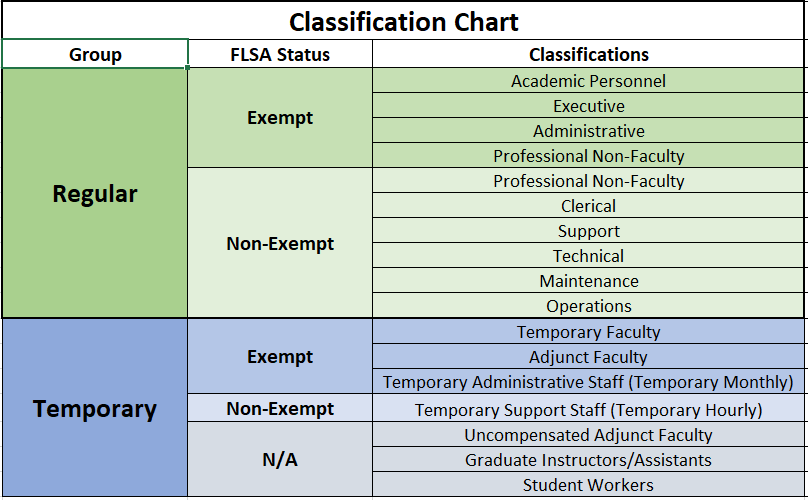
-
Temporary Employees
Temporary Employees-
All personnel whose initial period of appointment or expected service is less than one year. This definition should not be confused with employees who are designated as probationary employees, who may be regular full-time or part-time employees, and who are entitled to all leave benefits of such employees. If temporary assignments are recurring, then the university must make a decision to create and fund a regular position.
"Temporary employees" are ineligible for State benefits (retirement, state insurance, annual and sick leave, and holiday pay or longevity credit). However, limited term faculty appointments may be designated as positions eligible for benefits when budgeted. Temporary employees working on average at least 30 hours per week over a specified measurement period will be offered medical benefits under the Affordable Care (ACA).
After one year of employment as a temporary employee, the university shall consider adding a position with benefits if the assignment is needed on a regular basis. The process for filling the position will follow the Guidelines for Filling Faculty, Administrative, and Clerical/Support Vacancies.
Temporary employees contracted through a temporary staffing agency or as an Independent Contractor are not university employees. Once an Independent Contractor has been placed on Payroll, they are considered an employee and will no longer be able to be an Independent Contractor.
-
Other
-
Student Workers
-
Graduate Students
Graduate Assistants (GAs) can either work in teaching, research, or administrative roles depending upon the position.
In order to meet eligibility requirements student must meet the following requirements:
- Register for at least 9 graduate credit hours in the fall and spring semesters. For summer contracts, if the contract ends June 30th the student must register for 3 hours in pre-summer or summer session I. If the contracts goes through August the student must register for 3 hours during summer session II. If the summer contract begins in May and ends in August, the student must register for 6 hours in any of the summer sessions (pre-summer, session I, and/or session II). The student may divide the 6 hours between sessions, for example; 3 credit hours in session I and 3 more in session II.
- Not accept Tuition Scholarships if he or she is not a first year graduate student. (No TS contracts will be accepted after the Friday before classes begin).
- Not be employed anywhere else on campus.
- Be admitted unconditionally to the degree program. (1 semester exception)
- Maintain a 3.0 GPA.
Human Resources and Payroll Procedures
- Payroll procedures
- To advertise a GA/TS vacancy go to: https://www.etsgradschoolschool/vacancy.php
- For a listing of available GA/TS positions go to: https://www.etsugradschoolschool/funding/gats.php
- If any changes are made to an existing contract, a completed Fiscal Year Salary Allocation form must be sent to the following people:
- Queen Brown - Graduate School
- Pauline Stout - Human Resources
- Stacey McDonald- Financial Aid
-
Undergraduate Students
Student service positions allow students to earn part of their educational expenses by working part-time under the Federal Work Study Program (FWS) or the Regular Student Work Program (RSWP).
The Academic Performance Scholarship Program is ETSU's largest merit based scholarship program for new freshmen students from TN and border counties eligible for in-state tuition. These scholarships are awarded based on a combination of high school GPA and ACT/SAT scores for freshmen.
The ETSU Research Discovery Program is designed to give students exposure to research projects and skills in their fields of study. The program allocates undergraduate work-study students into "research assistant" positions working under the supervision of a campus faculty member.
These positions are the responsibility of the Office of Financial Aid and Scholarship
JobX: Student Employment SystemFor Details Contact the Office of Financial Aid and Scholarships.
-
-
International
East Tennessee State University (ETSU) is an Equal Opportunity/Affirmative Action employer and does not discriminate on the basis of race, color, religion, creed, sex,sexual orientation, gender identity/expression, age, genetic information, national origin, disability status, veteran status, or any other legally protected class in its programs and activities. ETSU specifically finds that diversity of faculty, administrators, and staff is a crucial element of the educational process and reaffirms its commitment to enhancing education through affirmative action to increase diversity at all levels.
Helpful Links:
- Non-Resident Alien Hiring Process
- Departmental Information/Nonresident Alien Tax Compliance
- International Programs & Services: Useful Links
- International Student Employment Policy
- Auxiliaries Fiscal Management/Nonresident Alien Tax Compliance
- GLACIER Information
- USCIS Website
- U.S. State Department Visas Web Site
-
-
-
The Hiring Process
-
The Process
The Hiring Process begins once a need has been identified and defined by the Hiring Authority.

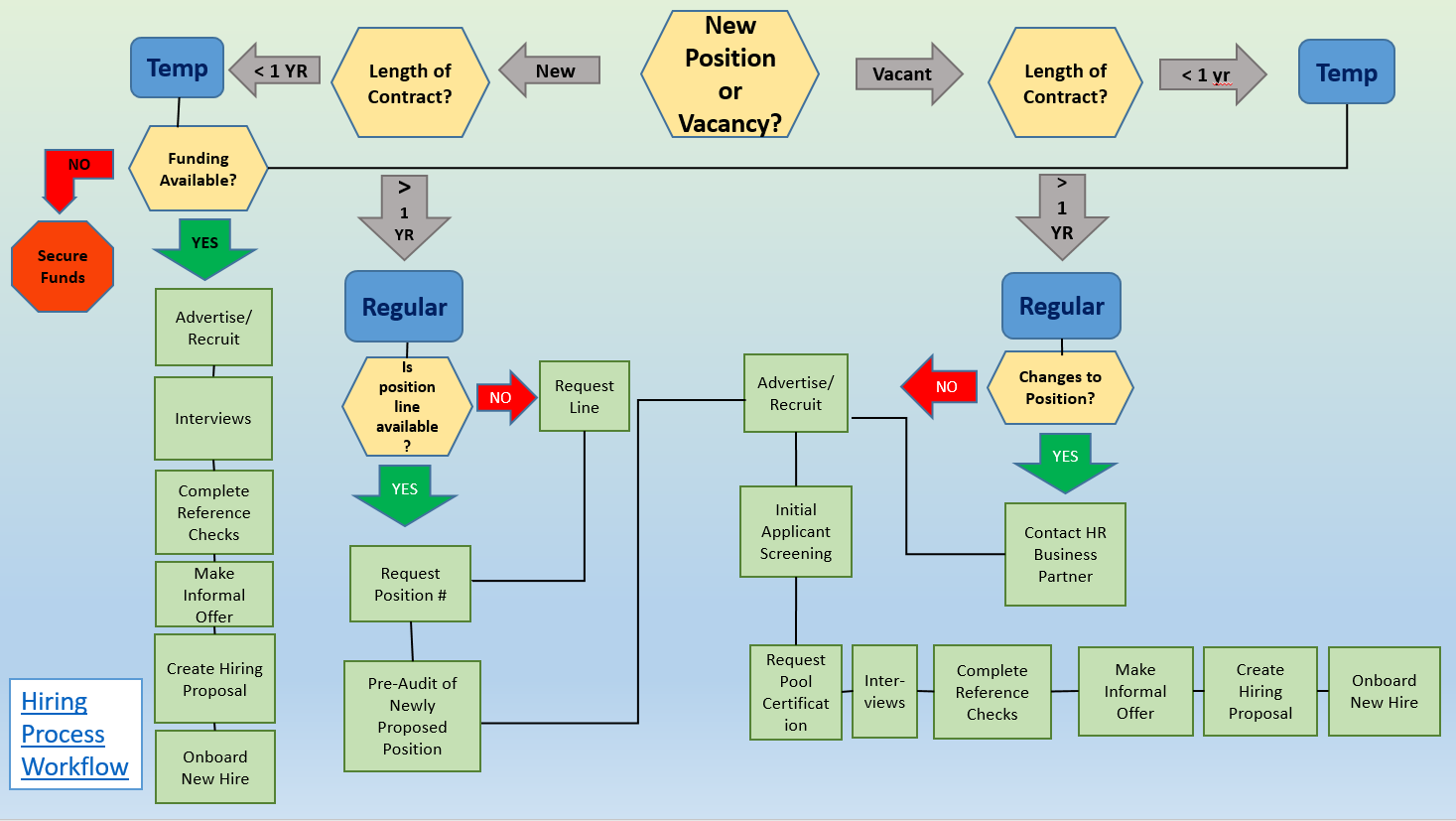
-
Guidelines
The University's legal obligations as a federal contractor require it to design specific efforts to promote equal employment opportunity. Federal regulations require contractors to take affirmative action to recruit, employ and promote qualified protected class individuals. To review ETSUs Affirmative Action plan, please visit University Compliance.
The purpose of the below guidelines is to provide direction for an efficient and consistent competitive hiring process that promotes equal employment opportunity and a highly effective workforce.
-
Submitting a Hiring Proposal
-
eJobs
Regular Hire Approval Workflow:
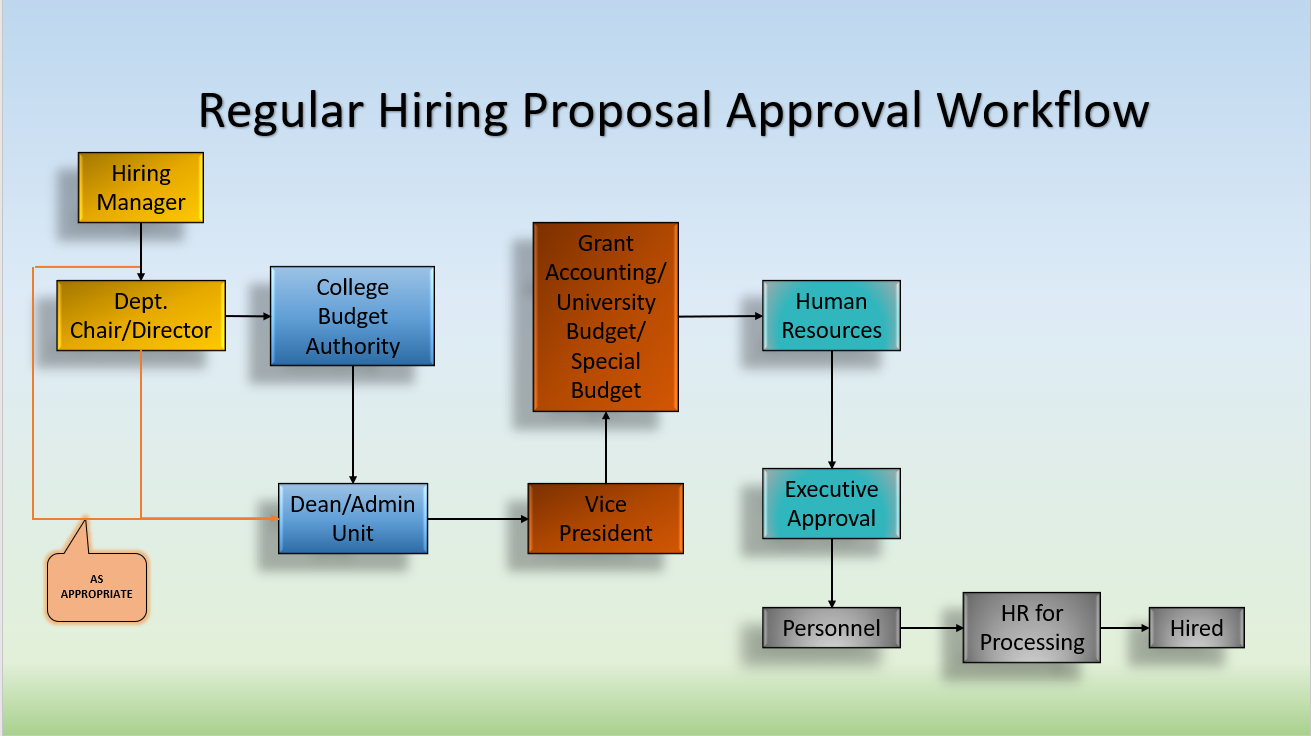
Temporary Hire Approval Workflow:
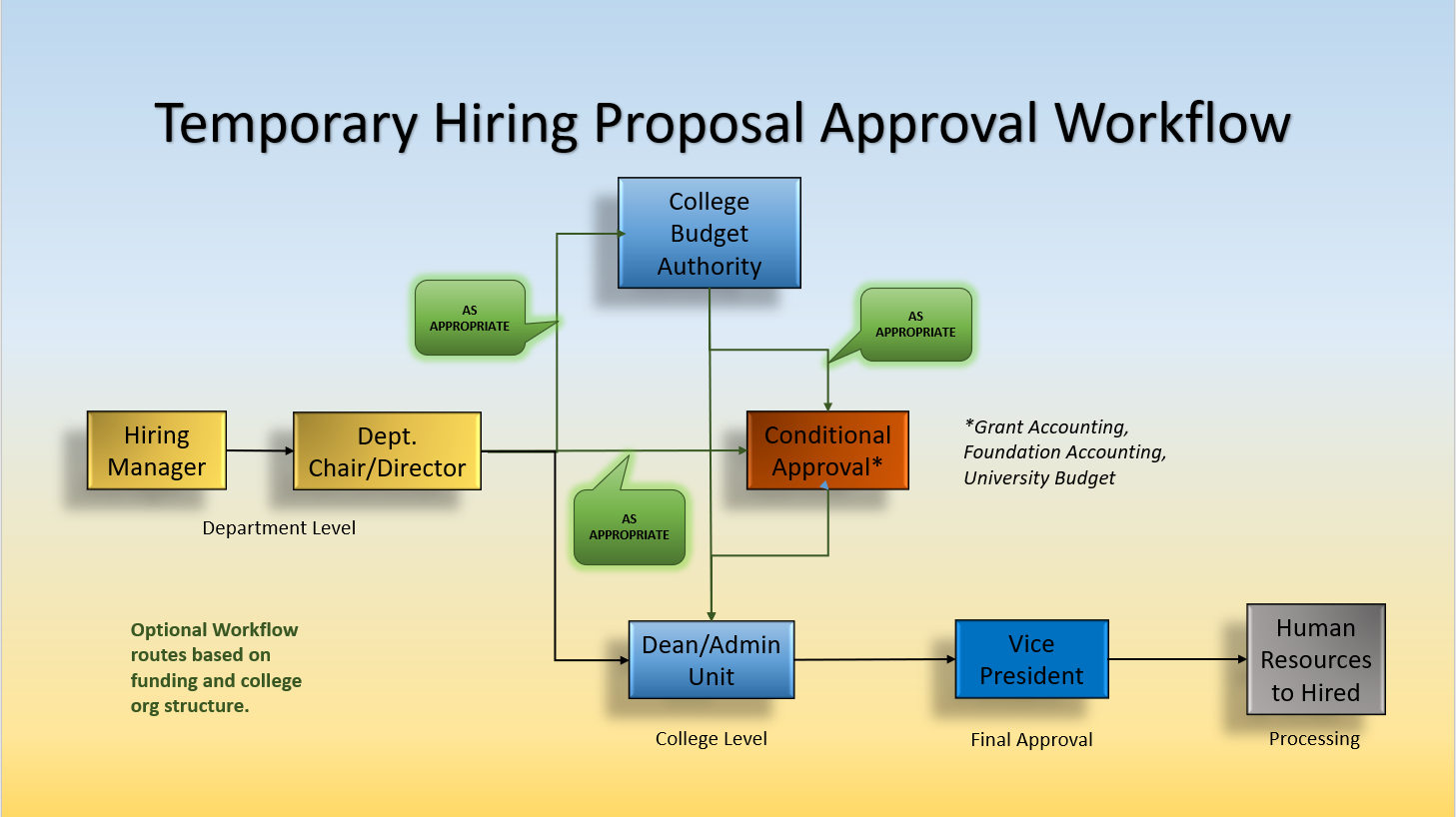
Hiring Proposals can move forward or backward in the approval chain.
Regular HP Flow Options:
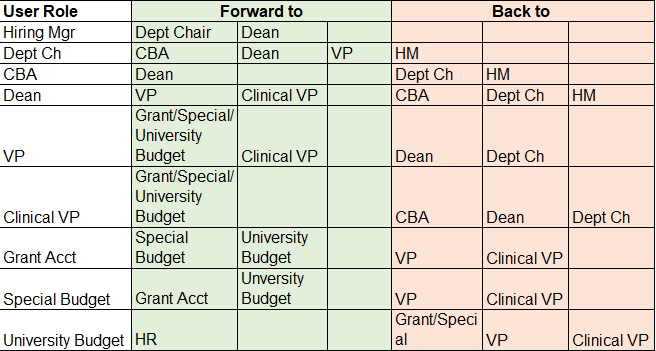
Temporary HP Flow Options:
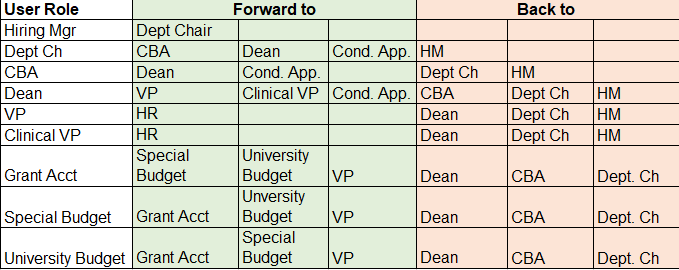
-
eContractsracts
Adjuncts:
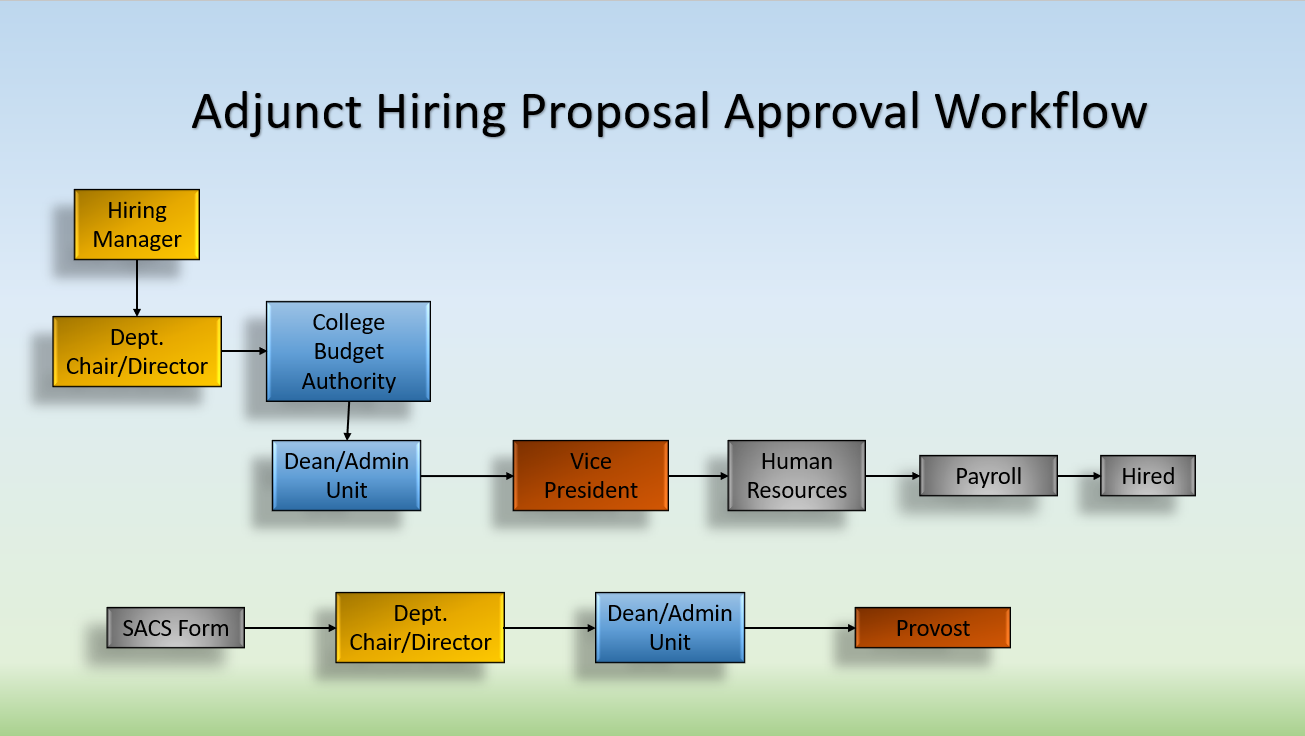
Graduate Assistants:
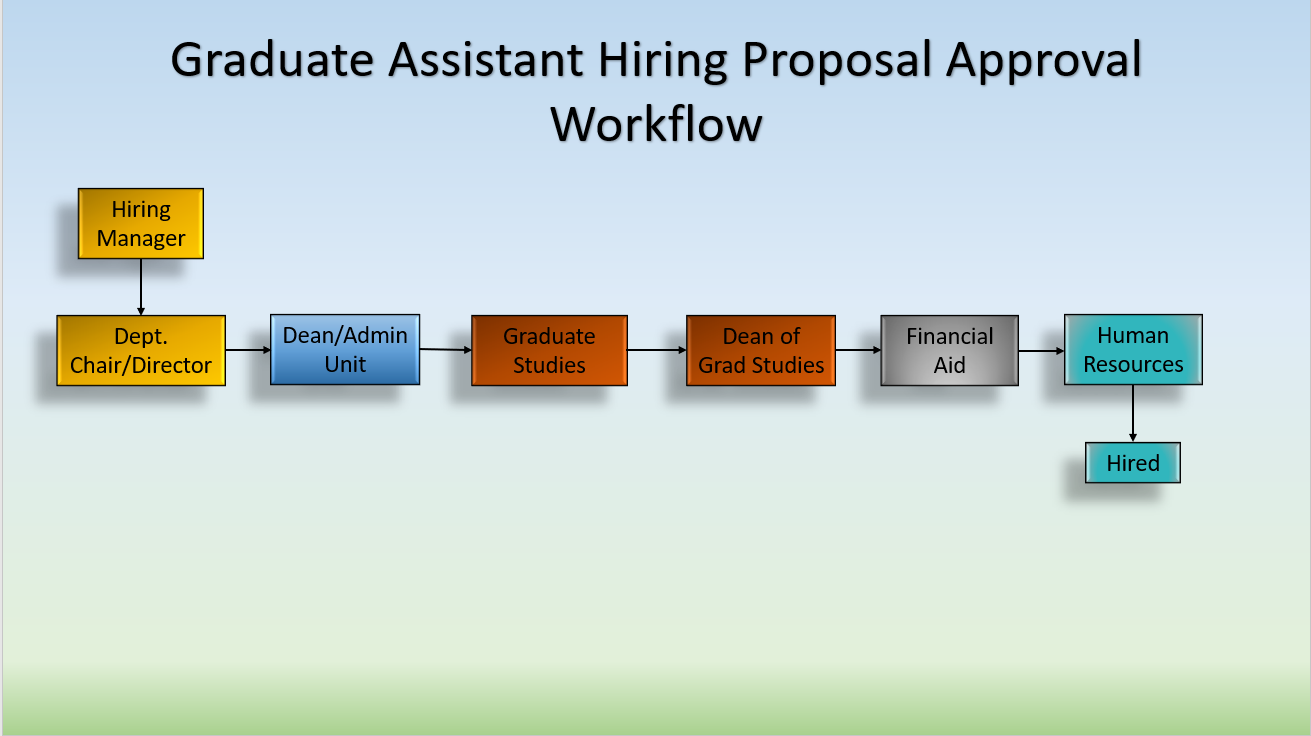
-
Conditional Approvals
Grant Accounting- Required for any hiring proposal with a salary funded by a grant.
Foundation Accounting-Required for any hiring proposal with a salary funded by a foundation account.
Graduate School-Required for any employment contract involving a graduate student.
Tax Compliance-Required for international hires.
-
-
Contract Processing
-
Pre-Employment Paperwork
-
Required Paperwork
I-9
- Required by federal regulations.
- MUST be completed within 3 days of first day worked.
- Employment verification documents must be presented to Human Resources office before it is complete.
- Original documents required.
W-4
- Required by federal regulations.
- MUST be completed before Payroll Processing.
Direct Deposit Form
- Required by University Policy.
- MUST be completed before first payroll deadline.
GLACIER
- Required for International hires.
- Required by federal regulations.
- MUST be completed before first payroll deadline.
-
Dynamic Forms
- Pre-employment paperwork (excluding GLACIER) is completed via Dynamic Forms for ALL hires.
- Dynamic Forms created more transparency to HR's internal processes.
- With the change to Dynamic Forms for pre-employment paperwork, Hiring Managers now
have the ability in eJobs to regularly monitor the "Hiring Proposal Documents" screen
to confirm when the pre-employment paperwork has been completed and attached by HR.
- Hiring managers now receive an email notification in eJobs that hiring paperwork was requested from the new hire.
- Hiring Managers should be monitoring their hires to ensure hiring proposals are approved and successfully processed in a timely manner.
-
FAQs
- Links to Pre-employment paperwork are visible to all, but only accessible by HR and Payroll.
- Re-hires may not be required to complete a new I-9. Re-hires should contact HR prior to completing pre-employment paperwork.
- Existing employees moving to a new position are not required to complete any new pre-employment paperwork. Pre-employment paperwork may be utilized for these individuals if updates to a W-4 or Direct Deposit form are needed.
-
-
HR Processing
Understanding eJobs HR Workflow States:
- In order to be approved for work, a hire must have a signed contract and have completed all required employment paperwork (I9, W4, direct deposit, etc.). Once those things occur, a new employee is authorized to work. However, the hire will not have access to systems until they are added to the systems (via contract processing).
- Currently our systems require both an employee record (which HR creates) and a job record (which Payroll creates).
- An employee record will generate the new hire’s employee id number (E#).
- A hiring proposal will only be marked as hired when HR Processing is complete.
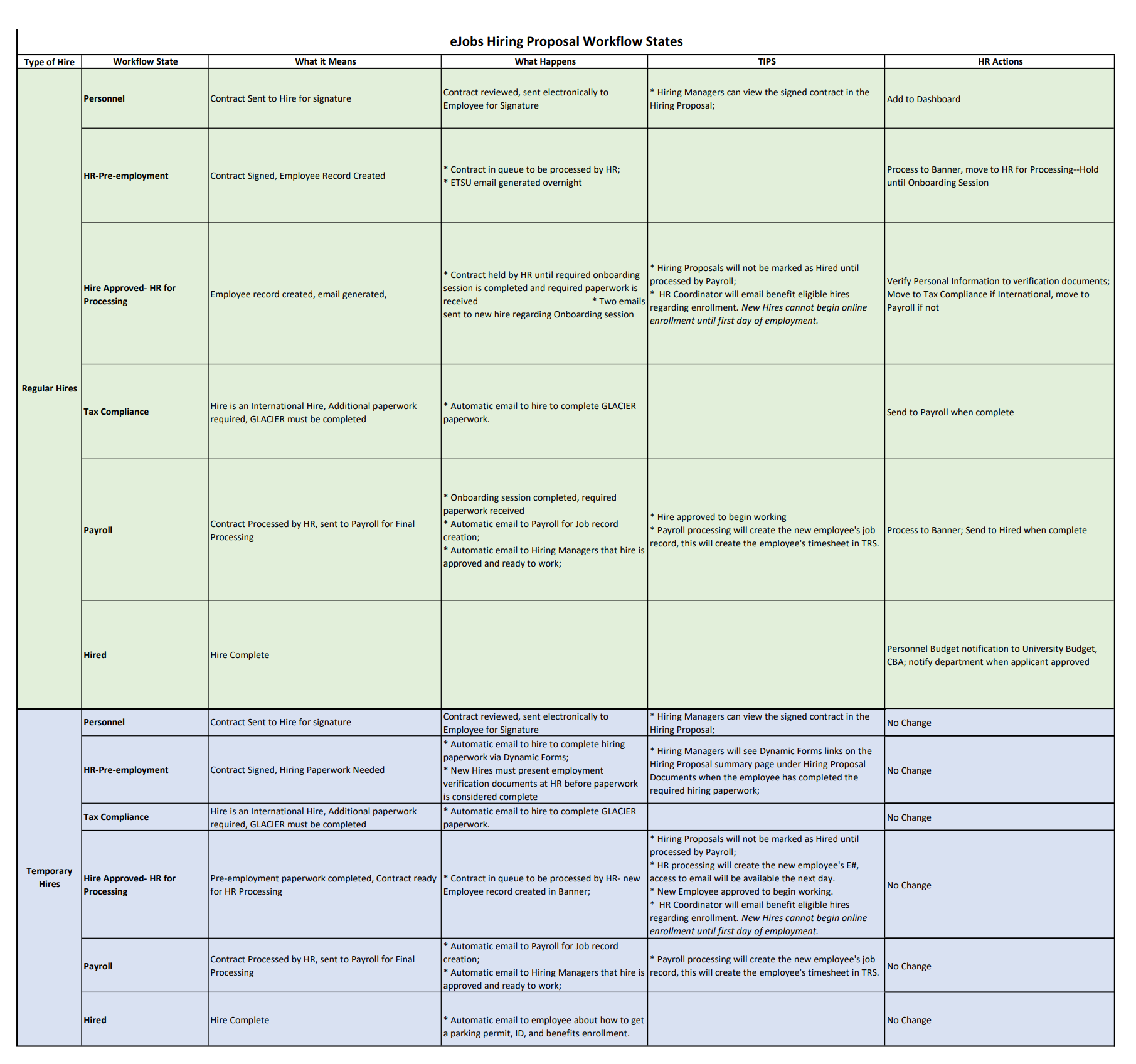
HR Processing Workflow Steps Chart
For questions regarding HR Contract Processing, please call: 423-439-4457 or email hr@etsu.edu.
-
Payroll Processing
Payroll creates an employee's job record. A job record will generate the new employee's ETSU employee email address and add the employee to the timekeeping system (TRS).
Once a new hire has an id number (E#) and email address, then access to other systems can be requested/granted.
For questions about timesheets or TRS, please call 423-439-5320 or email payroll@etsu.edu.
-
-
-
Who is Involved?
-
eJobs User Groups
User Group:
Available Actions:
Employee View personal position description and performance appraisals. Applicant Reviewer View applicant applications for a specific posting and move applicants to different work states (e.g. Recommend for Interview) Search Committee Member View applicant applications for a specific posting. Hiring Manager Create postings and hiring proposals for an assigned department(s) or division; Able to request minor changes to a position description in the Position Management module. Dept. Chair/Director; Dean/Administrative Unit; Vice President/President Create, review, and approve postings and hires for a department, function, or division; Able to request minor changes to a position description in the Position Management module. University Budget Review and approve hires for the University. College Budget Authority Review and approve postings and hiring proposals in academic divisions. Grant Accounting Review and approve grant funded hires. -
Roles, Responsibilities, & Expectations
More Information Coming Soon! -
Approval Chains
**Notify HR at hr@etsu.edu of any updates/changes to approval chain list.**
-
-
Moving & Immigration Expense Allowance
Newly hired full-time employees who relocate from their former residence to a new residence within the first 12 months of employment may be issued a one-time moving allowance, if deemed appropriate.
To be eligible to receive a moving allowance and to comply with the current guidelines published by the Internal Revenue Service (IRS), the move must meet the minimum IRS distance test of 50 mile from the location of the former residence. The moving allowance is paid directly to the employee, reported as taxable income, and is subject to all tax liability at the time of payment.
Immigration Expense Allowance - New employees may receive reimbursement for immigration expenses when considered to be in the interest of the institution and when such payment is a part of the employment negotiation with a new employee or the relocation of a current employee from another employer or institution. Reimbursement/fee allowance for immigration fees must be approved in advance by the President or his/her designee. For information regarding immigration matters, visit The Office of University Counsel.
For detailed information, see Moving & Immigration Expense Allowance.
-
Employment Laws/Personnel Policies
-
Tips and Tricks
The Hiring Manager should be monitoring their hires to ensure that hiring proposals are approved and successfully processed in a timely manner. With the changes to HR processes, the internal processes have been made more transparent for departments. The system enables anyone in the approval chain to view and monitor completion without notification from Human Resources.
The approval history can be viewed, along with emails that are sent and to whom they are sent under the history in eJobs. The newest feature, with the change to Dynamic Forms for pre-employment paperwork, is that departments now have the option in eJobs to regularly monitor the "Hiring Proposal Documents" screen to confirm when the pre-employment paperwork has been completed and attached by HR.
In order to be approved for work, a hire must have a signed contract and have completed all required employment paperwork (I9, W4, direct deposit, etc.). Once those things occur, a new employee is authorized to work. However, they will not have access to systems until they are added to the systems (contract processing). Currently our systems require both an employee record (which HR creates) and a job record (which Payroll creates). An employee record will generate the new hire’s employee id number (E#). A job record will generate a new hire's ETSU employee email address. Once they have an id number and email address, then access to other systems can be requested/granted. Some accesses are automatic, such as emails, Goldlink, and some others and some are not—eBucs, Banner, etc. These are tied to an individual. The job record is tied to the position number/budget line. This is the record that Payroll creates, and ties the employee to the position. When this happens, you can see the employees in TRS.
The eContracts system for renewals also permits those in the approval chain to view the history of a request. A contract will not be marked as complete in that system until the contract has been processed by HR. This is also something that the hiring manager should monitor.
Onboarding
-
What is Onboarding?
Onboarding is a key factor in employment retention and it begins with the selected candidate accepting the offer. Often times onboarding and orientation are confused.
- Orientation is a one-time welcoming event, that typically consists of paperwork and an overview of the institution's mission, vision, core values, and provides a brief introduction to the institution's culture.
- Onboarding is a sequence of strategic events, including orientation, that assist new employees with the knowledge and tools on how to be successful in their new role.
Pre-Employment Documentation via Dynamic Forms:
The Office of Human Resources has developed and implemented a new process for the collection pre-employment documentation from all applicants via the ETSU Dynamic Forms system. This will streamline and simplify the new hire experience and present all offices involved the opportunity to increase overall efficiency. The Onboarding/Employee Records module of eJobs is no longer being used to collect pre-employment documentation, such as Forms I-9 and W-4. An applicant is prompted via automated email to provide these documents via Dynamic Forms when their Hiring Proposal reaches the status of “Hire Approved – HR for Processing.” Human Resources will then update the “Hiring Proposal Documents” section of each Hiring Proposal as these pre-employment documents are completed, prior to moving the Hiring Proposal forward to the status of “Hired.” Hiring Managers will not have access to view these pre-employment documents but they are encouraged to routinely visit the “Hiring Proposal Documents” section of each Hiring Proposal to VERIFY the completion of each pre-employment document for tracking purposes within each department.
-
Helping new hires through the hiring process is the responsibility of the hiring department. Refer new employees to the New Employee Welcome webpage for information on the new hire orientations and a list of required paperwork.
In addition to the required Human Resources orientation, departments should conduct an orientation of the work area and an explanation of employee’s responsibilities and working conditions. The Department/Job Orientation Checklist provides the supervisor and the employee guidelines for reviewing departmental policies and procedures. When completed, the checklist should be returned by the new employee’s immediate supervisor and to the Office of Human Resources for inclusion in the employee’s personnel file. A department orientation is mandatory for the Department of Facilities Management.
Assisting new hires through the hiring process, and beyond orientation, is the responsibility of the hiring department. The purpose of onboarding is to give new employees the tools, training, and knowledge needed to be successful.
Trainings, Forms & More
Common Employment Links
- Bucs Are Back
- Compensation plus Benefits Calculator
- Non-Exempt Employee Adjunct Pay Cxlsxlator (.xlsx)
- ETSU Campus Maps
- Faculty Handbook
- Pay Tables/Salary Schedules
- Student Worker Programs
- Temporary Employment
- University Policies
- Department of Labor Workplace Posters (State & Federal)





